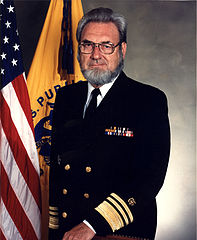C. Everett Koop, RIP, father of the evangelical pro-life movement
 Former U. S. Surgeon General C. Everett Koop died Monday at the age of 96. Many of the headlines about his death have focused on his time as a member of President Reagan's cabinet and his breaks with conservative allies on government policies regarding tobacco and AIDS.
Former U. S. Surgeon General C. Everett Koop died Monday at the age of 96. Many of the headlines about his death have focused on his time as a member of President Reagan's cabinet and his breaks with conservative allies on government policies regarding tobacco and AIDS.
Evangelicals of a certain age will remember their first encounter with Koop, in the 1979 film series Whatever Happened to the Human Race?. Koop, then a leading pediatric surgeon, appeared in the series with Christian philosopher Francis Schaeffer reviewing threats to the sanctity of human life -- abortion, infanticide, and euthanasia -- and calling their fellow Christians to take action to resist these threats.
David Bayly, who knew Koop personally, writes:
The Roman Catholic pro-life movement had its legion of stalwarts in the seventies and early eighties: Joe Scheidler, Mother Theresa, Father Paul Quay, Archbishop O'Connor; the list is impressive. And Evangelicalism? Who were her pro-life leaders? There literally weren't any, at least initially. But then God brought Everett Koop and Francis Schaeffer together and the battle was joined from the Protestant side. It's not an exaggeration to say that Dr. Koop and Francis Schaeffer were the twin fathers of the modern Evangelical pro-life movement.So we praise God for the life and witness of Dr. Koop. He was there when almost no one else was. Some in the Christian Medical Society may lionize Dr. Koop at his death, but they will perhaps have forgotten Dr. Koop's disgusted resignation from an organization he helped found for its refusal to take an officially pro-life position--a stance he maintained even after Tim's and my father assumed its presidency for a few years in the early 80s. Despite their friendship, Dr. Koop refused Dad's request that he rejoin. Even after passage of a clear and forceful pro-life stance, he initially refused to rejoin an organization that, as he saw it, had been cowardly on the central moral issue of the day.
Read the whole thing. Bayly tells of Koop's correction and encouragement to him as an amateur boy scientist, an anecdote that highlights Koop's devotion to science.
Before he became a public figure, Koop was a pioneering pediatric and neonatal surgeon. From the Philadelphia Inquirer's obituary:
After interning at Pennsylvania Hospital, Dr. Koop joined Children's in 1948, the staff's first pediatric surgeon. For a time, he was the hospital's entire surgery department. When he retired at 66, he presided over 26 full-time surgeons in eight specialties.Dr. Koop was a pioneer in surgery on newborns, developing techniques for birth defects that, before him, had meant certain death.
The parents of ailing children saw him as heroic. He achieved national prominence in 1974, when he headed a team of 20 surgeons that separated conjoined twin girls who had been born in the Dominican Republic....
To save a life, he did not always follow the rules. In a 1968 interview in Philadelphia Magazine, he told how, on an icy night in 1953, he had received a call from Pennsylvania Hospital about a newborn who had been delivered with abdominal organs in the chest.
Within minutes, Dr. Koop drove to the hospital, parked his car on the sidewalk, and raced to the delivery room. He wrapped the baby in a blanket, placed it on the floor of the car near the heater, and drove back to Children's.
He took no X-rays. He carried the baby to the operating room, opened the chest, put the organs in their proper place, repaired a hole in the diaphragm, and closed it back up.
He had broken all the rules, he said, and would not have followed that procedure at the time of the interview. "On the other hand," he said, "we had a living baby."
He rejected abortion and abhorred amniocentesis, a test to see if a fetus has genetic defects. He labeled it "a search-and-destroy mission." Most women who have amniocentesis did not keep their babies if a defect was found, he noted. "Many of the congenital defects are things that I have spent my entire life correcting," he said.
MORE:
Whatever Happened to the Human Race, as a YouTube playlist:
C. Everett Koop papers at the National Institutes of Health
The C. Everett Koop Institute at Dartmouth
P. S.: The Inquirer obit mentions that the Senate held up his nomination for 10 months. I suspect (can't find the details) that Senate Democrats were responsible for that hold. He wasn't the only Republican appointee to be blocked by Democrats, and present-day Senate Republicans should remember that even as a minority party they have leverage and ought to use it for the good of the country.
0 TrackBacks
Listed below are links to blogs that reference this entry: C. Everett Koop, RIP, father of the evangelical pro-life movement.
TrackBack URL for this entry: https://www.batesline.com/cgi-bin/mt/mt-tb.cgi/6765
I haven't thought about Dr. Koop for a while, but I recall admiring his work as Surgeon General in the 1980s.
I do NOT recall that Dr. Koop used that office to enforce his pro-life beliefs in contravention of what the Supreme Court had said is the law of the land. Rather, Dr. Koop used his reputation and powers of persuasion to lead on that issue.
I have no doubt that Dr. Koop has now heard the words "Well done, good and faithful servant."